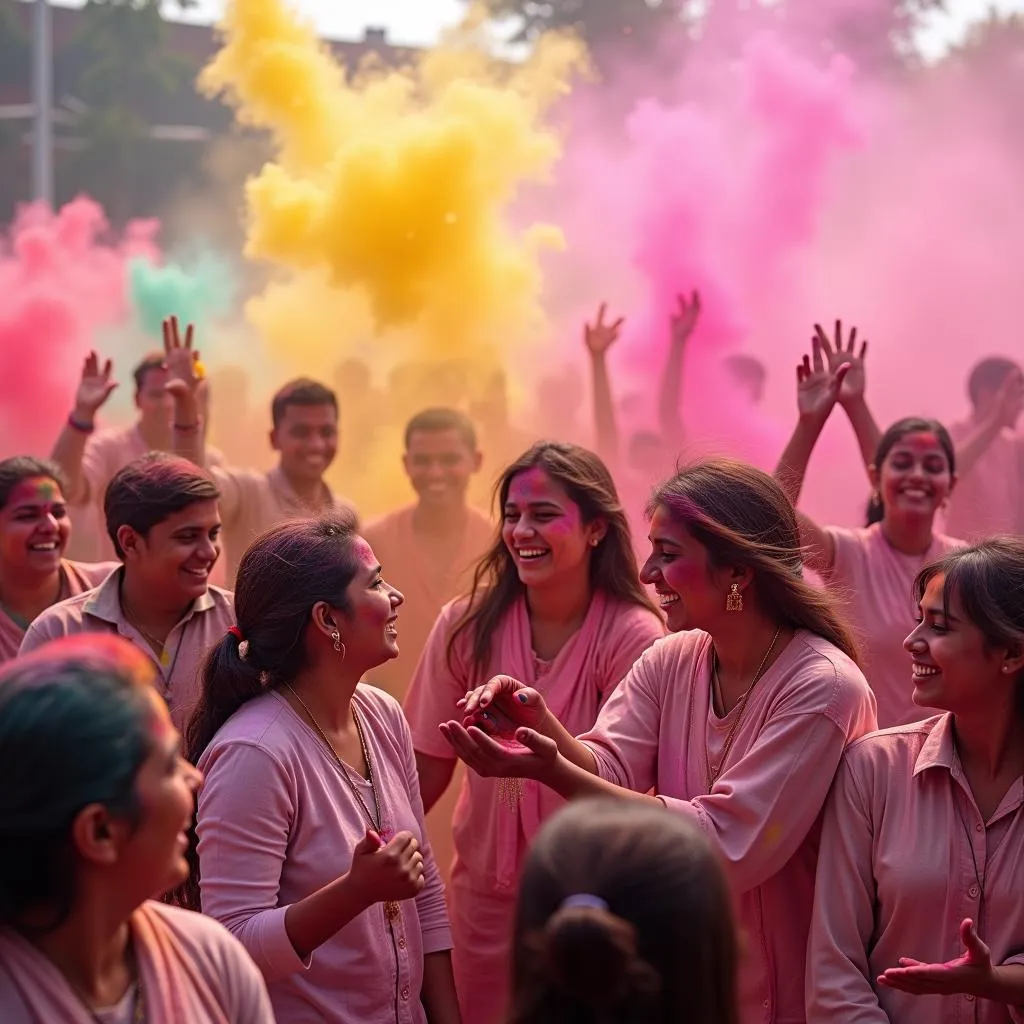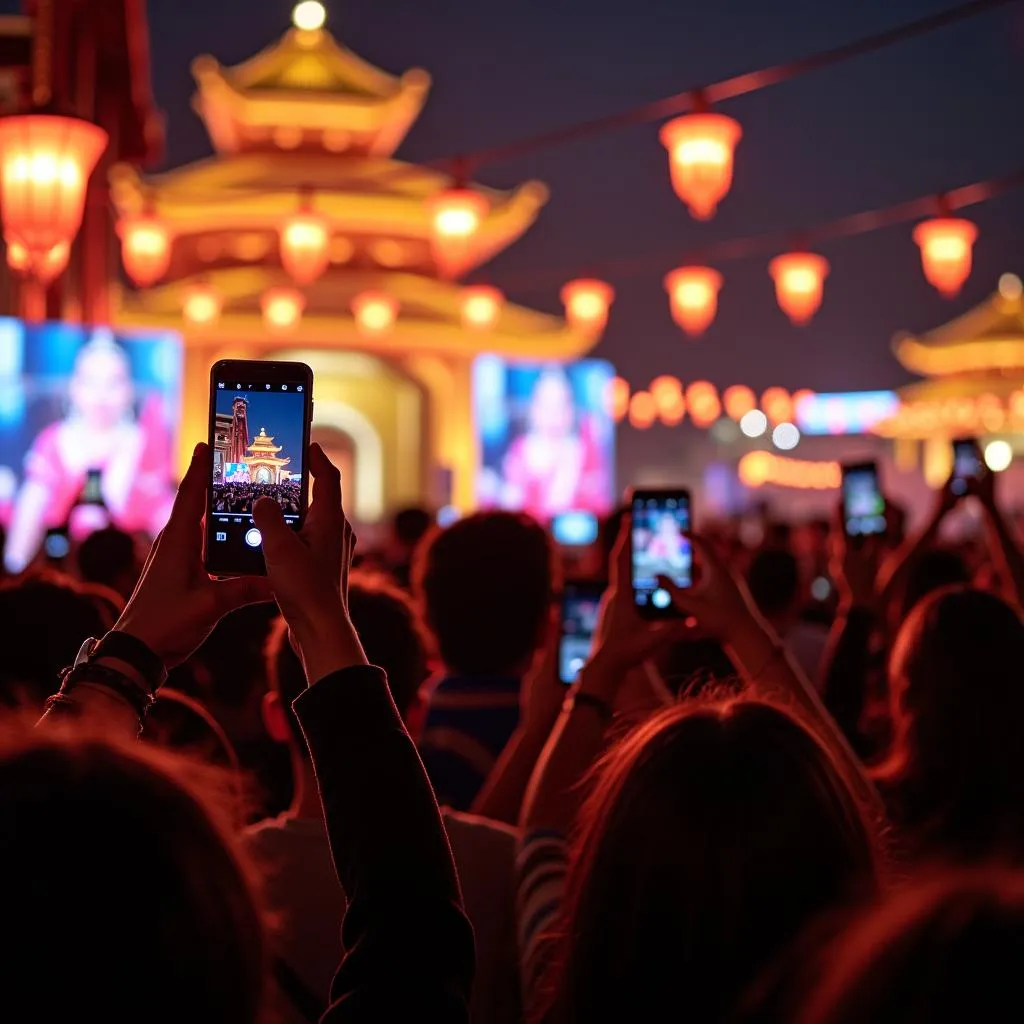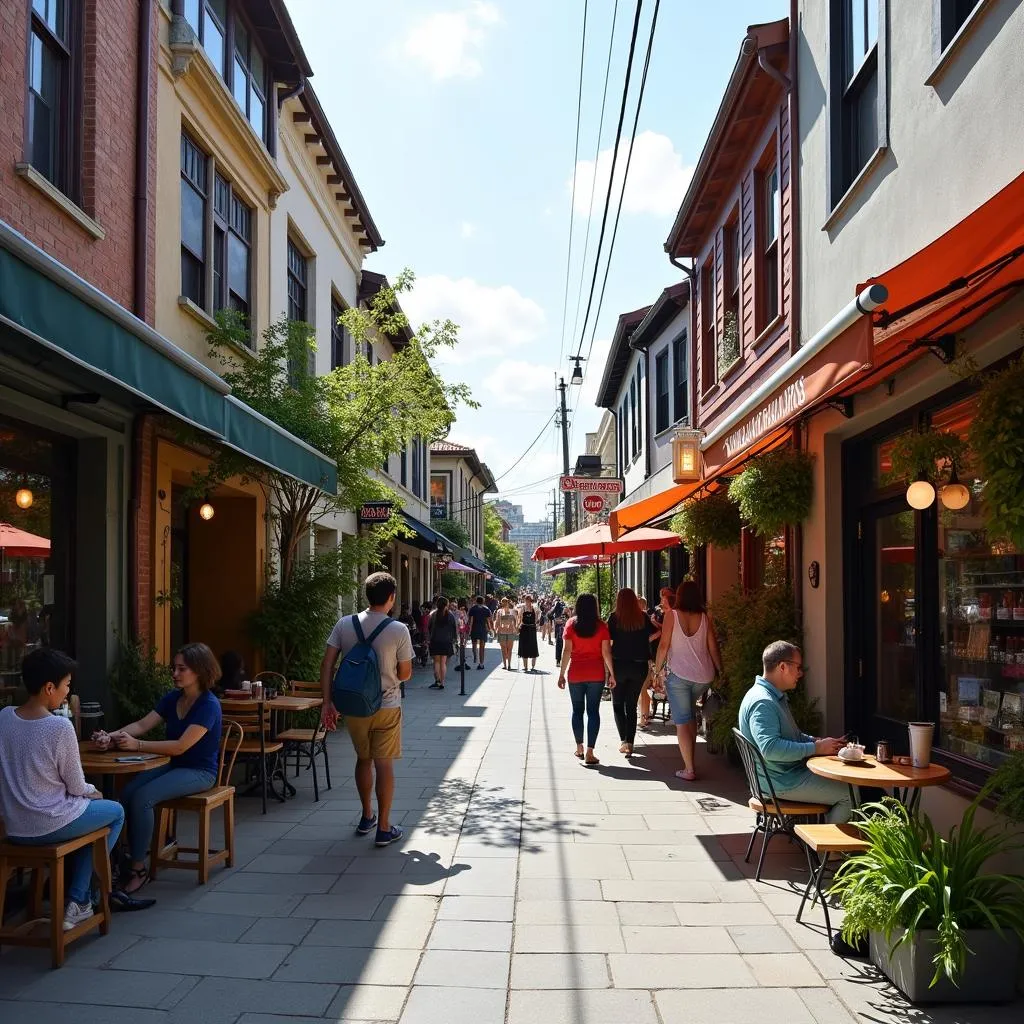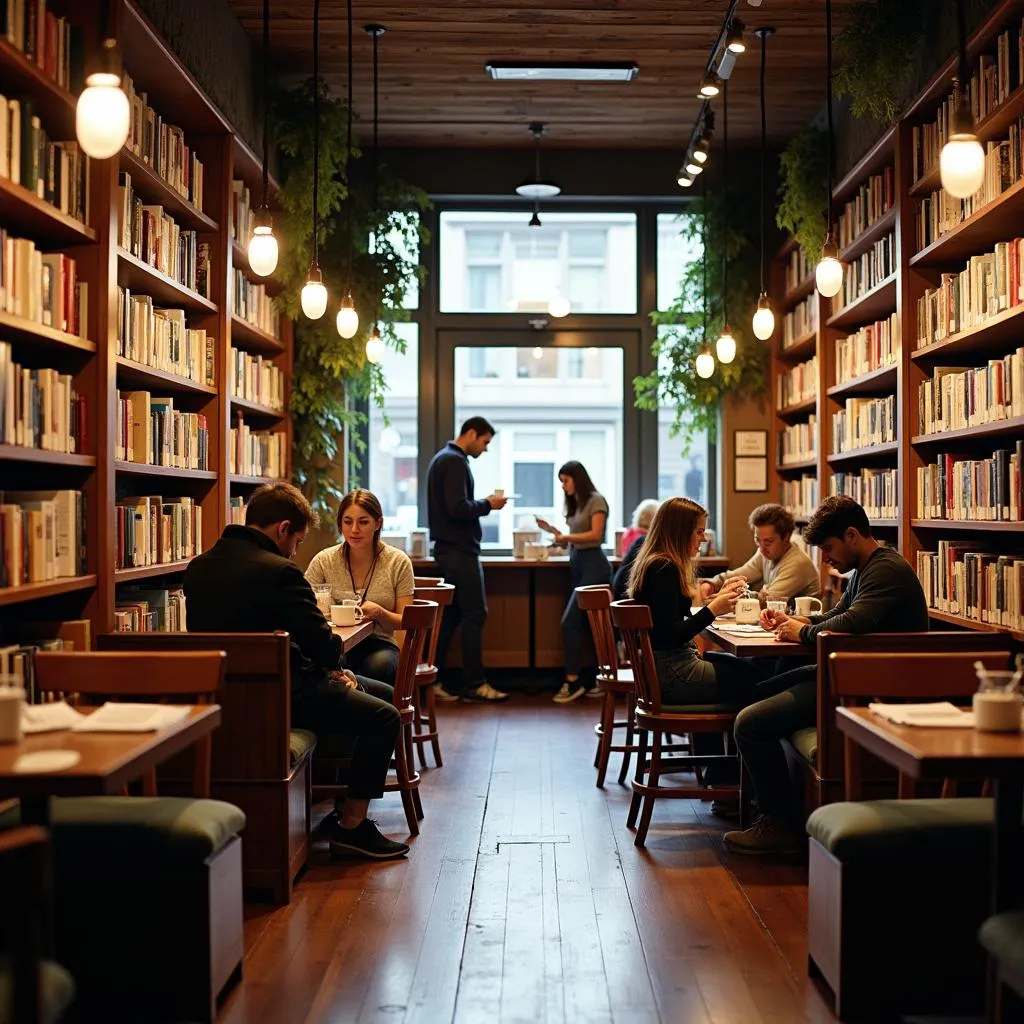The topic of describing a festival you enjoyed celebrating is a common theme in IELTS Speaking tests. It has appeared frequently in past exams and is likely to continue being a popular subject in future tests. This topic allows examiners to assess your ability to discuss cultural experiences, personal memories, and emotions while showcasing your language skills.
Nội dung bài viết
Describe a recent community event you attended can be a similar topic that may come up in your IELTS Speaking test. Being prepared to discuss various social gatherings will help you feel more confident during the exam.
Part 1: Introduction and Interview
In Part 1, the examiner may ask you some general questions about festivals and celebrations. Here are some common questions you might encounter:
- Do you enjoy celebrating festivals?
- What’s your favorite festival?
- How do you usually celebrate festivals in your country?
- Are there any festivals you don’t like? Why?
Let’s look at a sample answer for the question “What’s your favorite festival?”:
Sample answer (Band 7-8):
“My favorite festival is definitely Diwali, the Festival of Lights. It’s a vibrant celebration that usually takes place in October or November. What I love most about Diwali is the sense of unity it brings to families and communities. The whole atmosphere is filled with joy and excitement as people decorate their homes with colorful lights and rangoli patterns. The festival is also known for its delicious traditional sweets and the spectacular fireworks displays that light up the night sky. It’s a time when everyone comes together to celebrate new beginnings and the triumph of light over darkness.”
Part 2: Long Turn
Now, let’s move on to Part 2, where you’ll be given a cue card to speak about for 1-2 minutes. Here’s a sample cue card related to the topic:
Describe a festival you enjoyed celebrating. You should say:
- What the festival was
- When and where you celebrated it
- Who you celebrated it with
- And explain why you enjoyed it so much
Sample answer (Band 6-7):
“I’d like to talk about the Lunar New Year festival, which I celebrated last year in Vietnam. It’s also known as Tet and is the most important holiday in Vietnamese culture.
The celebration took place in late January, and I was fortunate enough to spend it with my Vietnamese friend and her family in their hometown near Hanoi. It was my first time experiencing this festival, and I was amazed by the vibrant atmosphere and rich traditions.
What I enjoyed most about the festival was the sense of togetherness and the importance of family. We spent days preparing for the New Year by cleaning the house, decorating it with beautiful flowers, and cooking traditional foods. On New Year’s Eve, we gathered with the extended family for a special dinner and stayed up until midnight to welcome the New Year.
I was fascinated by the various customs, such as giving red envelopes with lucky money to children and elders, visiting temples, and playing traditional games. The streets were filled with colorful decorations, and everyone seemed to be in a festive mood.
Overall, I enjoyed this festival immensely because it allowed me to immerse myself in a different culture and experience the warmth and hospitality of Vietnamese people. It was a unique and memorable way to start the New Year, and I hope to have the chance to celebrate it again in the future.”
Sample answer (Band 8-9):
“I’d like to share my experience of celebrating the Holi festival in India last year, which was truly a once-in-a-lifetime experience. Holi, known as the Festival of Colors, is a vibrant and exuberant celebration that marks the arrival of spring and the victory of good over evil.
I had the privilege of participating in this cultural extravaganza in Jaipur, the Pink City of India, during early March. What made this celebration particularly special was that I was invited to join my Indian colleague and her extended family, which gave me an authentic insider’s perspective on the festivities.
The aspect of Holi that I found most captivating was its ability to break down social barriers and unite people in a spirit of pure joy and camaraderie. The night before the main event, we attended a traditional Holika Dahan ceremony, where a large bonfire was lit to symbolize the triumph of good over evil. The next morning, the streets erupted into a kaleidoscope of colors as people of all ages enthusiastically threw vibrant powders and water at each other.
What struck me most was the infectious energy and unbridled happiness that permeated the atmosphere. Everyone, regardless of age, social status, or background, participated with equal fervor. The air was filled with laughter, music, and the rhythmic beats of traditional drums. We indulged in delicious festive treats like gujiya and thandai, which added to the sensory delight of the occasion.
This celebration left an indelible impression on me for several reasons. Firstly, it offered a profound insight into Indian culture and its emphasis on community and shared joy. Secondly, the festival’s message of renewal and the triumph of good resonated deeply with me. Lastly, the sheer exuberance and uninhibited expression of happiness was incredibly liberating and refreshing.
In essence, celebrating Holi was not just about partaking in a festival; it was an immersive cultural experience that broadened my perspectives and created memories I’ll cherish forever. It exemplified the power of traditions to bring people together and celebrate life in its most colorful form.”
 Vibrant Holi festival celebration in India
Vibrant Holi festival celebration in India
Follow-up questions:
- How do festivals bring people together in your culture?
- Do you think traditional festivals are losing their importance in modern society?
Sample answer for question 1 (Band 8-9):
“In my culture, festivals play a pivotal role in fostering social cohesion and strengthening community bonds. They serve as catalysts for reuniting families and friends who might otherwise be separated by distance or busy schedules. These celebrations often involve shared rituals and traditions that have been passed down through generations, creating a sense of continuity and shared identity.
Moreover, festivals often transcend social boundaries, bringing together people from diverse backgrounds and age groups. They provide a common ground for interaction and create opportunities for cultural exchange, especially in our increasingly multicultural society. The collective participation in traditional activities, whether it’s preparing special foods, decorating communal spaces, or engaging in ceremonial practices, reinforces a sense of belonging and shared heritage.
Furthermore, many festivals in my culture incorporate elements of generosity and community service, encouraging people to look beyond themselves and contribute to the welfare of others. This might involve distributing food to the less fortunate or engaging in acts of charity, which not only brings people together but also strengthens the social fabric of our community.
In essence, festivals in my culture act as powerful social glue, reinforcing cultural values, fostering interpersonal connections, and creating lasting memories that bind people together long after the celebration has ended.”
Part 3: Two-way Discussion
In Part 3, the examiner will ask you more abstract questions related to the topic of festivals and celebrations. Here are some potential questions:
- How have festivals changed in your country over the years?
- Do you think globalization has affected traditional festivals? How?
- What role do you think festivals play in preserving culture?
- Should governments invest in promoting cultural festivals? Why or why not?
Let’s look at a sample answer for the question “How have festivals changed in your country over the years?”:
Sample answer (Band 7-8):
“Festivals in my country have undergone significant changes over the years, reflecting broader societal shifts. One notable change is the increasing commercialization of many traditional festivals. What were once primarily religious or cultural events have now become major commercial opportunities, with businesses capitalizing on festival-related products and services.
Another change is the impact of technology on how festivals are celebrated. Social media platforms have transformed the way people share their festival experiences, often leading to a more performative aspect of celebrations. Virtual gatherings and online events have also become more common, especially in light of recent global events.
Furthermore, there’s been a shift in the scale and scope of festival celebrations. Many festivals that were once intimate, family-oriented affairs have evolved into large-scale public events, often attracting tourists and gaining international recognition.
Lastly, there’s been a growing trend towards cultural fusion in festival celebrations. As our society becomes more diverse, we’re seeing the incorporation of elements from different cultures into traditional festivals, creating unique hybrid celebrations.
While these changes have brought new dimensions to our festivals, they have also raised concerns about preserving the authentic spirit and traditions of these cultural events.”
 Modern festival celebration with technology
Modern festival celebration with technology
Key Vocabulary and Phrases for High Scores
To enhance your IELTS Speaking performance when discussing festivals, consider using these advanced vocabulary items and phrases:
-
Cultural heritage /ˈkʌltʃərəl ˈherɪtɪdʒ/ (noun): The legacy of physical artifacts and intangible attributes of a group or society.
Example: “Diwali is an integral part of India’s rich cultural heritage.” -
Commemorate /kəˈmeməreɪt/ (verb): To recall and show respect for an event or person.
Example: “The festival commemorates the victory of good over evil.” -
Festivities /feˈstɪvətiz/ (noun): Celebrations or activities associated with a festival.
Example: “The festivities lasted for three days, filled with music, dance, and feasting.” -
Time-honored /taɪm ˈɒnəd/ (adjective): Respected because of long tradition.
Example: “We participated in several time-honored rituals during the celebration.” -
Revelry /ˈrevəlri/ (noun): Lively and noisy festivities.
Example: “The streets were filled with revelry as people celebrated well into the night.” -
Spectacle /ˈspektəkl/ (noun): An impressive or grand visual display.
Example: “The fireworks display was a breathtaking spectacle that lit up the entire sky.” -
Jubilant /ˈdʒuːbɪlənt/ (adjective): Feeling or expressing great happiness and triumph.
Example: “The atmosphere was jubilant as people gathered to welcome the New Year.” -
Immerse /ɪˈmɜːs/ (verb): To involve oneself deeply in a particular activity or interest.
Example: “I was fully immersed in the local culture during the festival.”
Using these words and phrases in your responses can demonstrate a rich vocabulary and help you achieve a higher band score in your IELTS Speaking test.
Examiner’s Advice
To excel in the IELTS Speaking test when discussing festivals or any other topic, consider the following tips:
-
Practice regularly: Engage in conversations about various festivals and cultural events to build your confidence and fluency.
-
Expand your vocabulary: Learn and use a wide range of descriptive words and idiomatic expressions related to celebrations and emotions.
-
Develop your ideas: Don’t just list facts; explain your thoughts and feelings about the festival in detail.
-
Use a variety of grammatical structures: Incorporate complex sentences and different tenses to showcase your language skills.
-
Work on your pronunciation: Pay attention to word stress and intonation to enhance the clarity of your speech.
-
Stay relevant: Always address the question directly and stay on topic throughout your response.
-
Be authentic: Share genuine experiences and opinions rather than memorized responses.
-
Manage your time: In Part 2, use all the preparation time given and aim to speak for the full 2 minutes.
Remember, the key to success in the IELTS Speaking test is to communicate effectively and confidently while demonstrating your language abilities.
Describe a time when you enjoyed a traditional meal can be another interesting topic that allows you to discuss cultural experiences in your IELTS Speaking test. Being prepared to talk about various aspects of traditions and celebrations will give you an edge in the exam.


